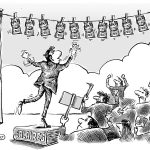Taxes, the wind from America
Joe Biden’s America is relaunching international cooperation on corporate taxation.
As early as her first audition at the Senate committee in January, Janet Yellen had set the tone 1 : with regard to corporate taxes, “the race to the bottom” is no longer appropriate. The 2008 crisis brought G20 governments together around the fight against tax havens. Will the Covid-19 pandemic be the turning point in the standardization of corporate taxation around the world?
In many ways, the Biden Administration’s proposal is timely. Faced with an unprecedented global recession that saw debts soar, many countries are in need of new revenue. For the European partners of the United States, the resumption of discussions on tax harmonization amounts, for the former, to satisfy their demand for taxation of internet corporations, and for the latter to dilute the reform into a more general measure, which would avoid an unacceptable stigmatization for any Administration in Washington. It is also relaunching more ambitious proposals for rethinking the tax architecture on the modes of compulsory levies on entities with undetermined geographic roots. Among those rallied to the cause, International Monetary Fund is in the fore, calling also for a temporary levy on the wealthiest.
Domestically, the Treasury Secretary did not fail to recall the spectacular drop in corporate taxation, which now represents a mere 1% of GDP, when the “arbitrations” of multinationals could still cost the country several hundreds of billions of dollars every year. The massive infrastructure plan, income distribution, there are the projects that find a real echo in the country of low redistribution, and need financing.
Expected increases in tax revenues alone will not meet accumulated deficits and debts
However, the proposal, as generous as it is, is puzzling. In the United States itself, let us recall that the new “Biden plan” of 2.5 trillion dollars, is far from being a done deal, and should be the subject of a long and difficult negotiation with the Congress, as some Democratic senators balk at a ratification. Its universal dimension also sounds like an admission, showing how America alone can no longer control and impose its taxation system. Would it seek in this way to strengthen its privilege of extraterritoriality? This could be if, as some specialists show, it was the first country to “lock up” its multinationals (the most numerous and the most important in the world), by being authorized to levy the difference between the tax rate of a given country, and the minimum rate set collectively. How to make accept such encroachments of sovereignty?
If some states seem ready to endorse the proposal, those whose taxation is at a threshold much lower than the proposed minimum rate of 21%, are obviously much more reluctant. Such a measure would in any case be a spectacular trend reversal. Over the past 20 years (between 2000 and 2020), the average corporate tax rate has fallen by 10% (from around 32% to 23%), among OECD member countries, still marking significant disparities.
Dangling the prospect of significant tax revenues could well be a mirror to the larks. In addition to the risk of many countries remaining outside such an agreement, expected increases in tax revenues alone will not meet the accumulated deficits and debts. Many small countries or emerging economies will probably stay away from such a windfall, at the risk of losing revenues and vital activities. The increase in taxation risks affecting mainly the companies that are the most “captive” in their territory and those most weakened by the pandemic. Finally, countries whose tax rate is still well above the proposed minimum level, far from benefiting from a surge in their revenues, would even be tempted – if not forced – to align with the minimum rate.
In the end, these measures could reshuffle the maps of international tax competition more than cancel it, while adding a brick to the factors of general price recovery.
Would the bride be too beautiful?
1 See our previous article: “When the soufflé falls” of January 26, 2021.
Original version in French language in Swiss Financial Website www.allnews.ch Cartoon by Barret



